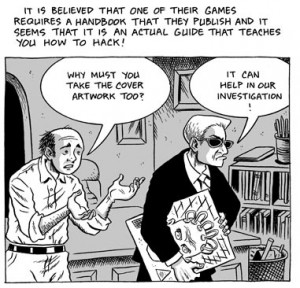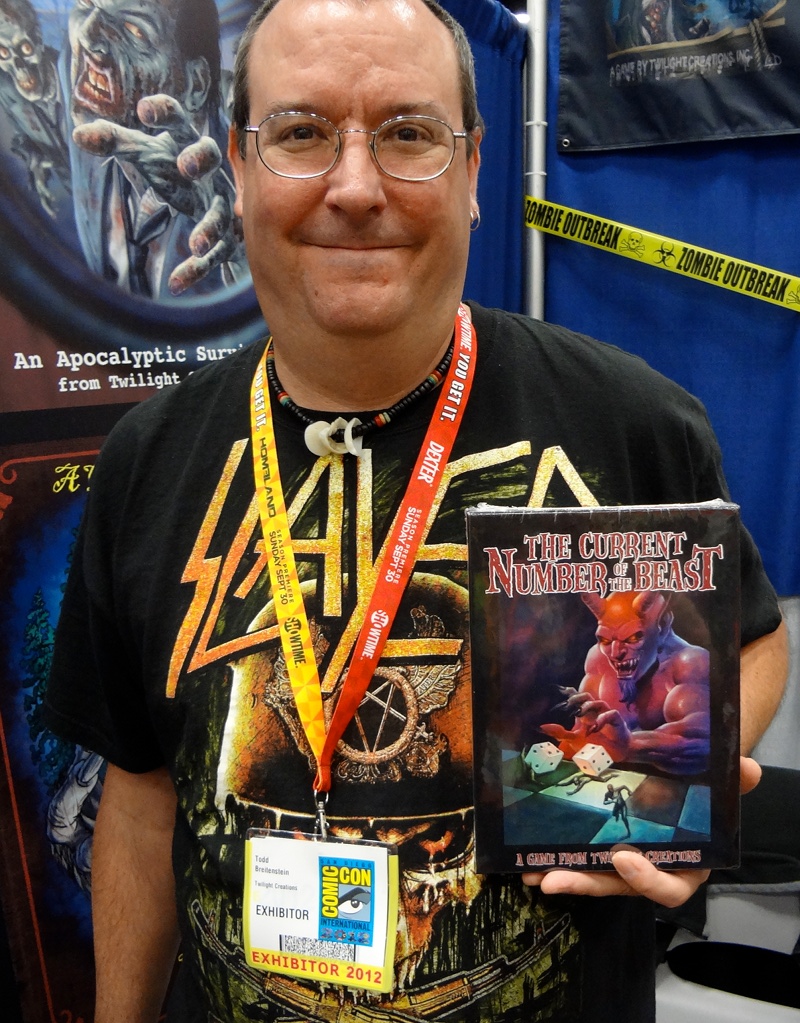Wizzywig: Where Hacking and Tabletop Gaming Collide
In addition to a latex sword for LARPing, some Paizo GameMastery Map Packs, and other gifts, my wife surprised me on my birthday with the graphic novel Wizzywig by Ed Piskor. Wizzywig follows the life of the fictional Kevin “boingthump” Phenicle, a composite character blending several real life hackers, most notably Captain Krunch and Kevin Mitnick. Piskor varies his engaging narrative frequently, switching mostly between Kevin Phenicle telling his story in the first person to Kevin’s best friend Winston’s radio talk show with smaller chapters each with a dozen characters giving a man-on-the-street perspective in their own single panels adding further variety and perspectives.
 Midway through Wizzywig I was surprised to recognize an event from tabletop gaming history pop up amidst the hacker chronicle. On March 1, 1990 Steven Jackson Games’ headquarters in Austin, Texas was famously raided by the Secret Service causing a “catastrophic interruption” for SJG, nearly shutting them down. I had only just started playing D&D at the time in 6th grade and was unaware of the raid, but it has come to have notoriety within the gaming world and helped in the formation of the Electronic Frontier Foundation.
Midway through Wizzywig I was surprised to recognize an event from tabletop gaming history pop up amidst the hacker chronicle. On March 1, 1990 Steven Jackson Games’ headquarters in Austin, Texas was famously raided by the Secret Service causing a “catastrophic interruption” for SJG, nearly shutting them down. I had only just started playing D&D at the time in 6th grade and was unaware of the raid, but it has come to have notoriety within the gaming world and helped in the formation of the Electronic Frontier Foundation.
While Piskor’s version of the GURPS Cyberpunk cover is close to the original it also reminds me of the artwork for the Crazy Occupational Character Class from Palladium’s RIFTS. The entire episode only appears in Wizzywig for half a page with Kevin “boingthump” Phenicle having no connection to it. We can get a chuckle out of the “media” reaction to the GURPS title below, but actual links between role-playing game supplements and possible criminal activities – however minor – can sometimes exist.
While the basic D&D and AD&D books of the 1980s were short on descriptions of how to actually pick pockets or locks, I had multiple friends trying to play the role of Thieves in real life. Were these inspired by the actions of their RPG characters? Yes. Did they ever keep a pilfered wallet or actually steal anything? No (not that I’m aware of). It’s unlikely that an RPG manual ever provides as good an example of criminal activities as fantasy fiction might. It’s also much more likely though that best-selling mainstream authors like Michael Crichton or Stephen King or popular TV shows like Dexter will be the ones to provide information on how to commit crimes and cover one’s tracks. Can a person learn about poisons from reading fantasy novels or from RPGs? Certainly, but an innocuous cookbook or encyclopedia is a more likely source. It’s also laughable to think that I can pick locks just because I have manipulated lock picks onscreen with my characters in Fallout 3 or Fallout: New Vegas. While I do make my PCs roleplay out their bribery attempts and attempts to intimidate or interrogate NPCs when I GM, actual knowledge of anatomy, torture devices, or the criminal underworld is not required.
Where the worlds of hacking and role-playing games do collide though is in the pursuit of knowledge and freedom. While Ed Piskor never goes into why exactly Kevin Phenicle hacks in Wizzywig, most actual “classical” hackers want uninterrupted access to knowledge. Many role-players want to know what it’s like to lose a comrade, win a war, or save the princess. Arguably the lowest level of hackers and the lowest level of gamers enjoy simple brute force attacks before they mature into wanting to do more with their respective hobbies. Gamers and hackers also want the freedom to game how they want to with many hackers hacking into games to improve them. While some sandbox video games are allowing more and more freedoms in gameplay, nothing has come close to replacing the freedom enjoyed by tabletop role-playing gamers.
Panels from Wizzywig are copyright Ed Piskor and used with permission. Views expressed are my own and not Ed Piskor’s or Top Shelf Productions’.


